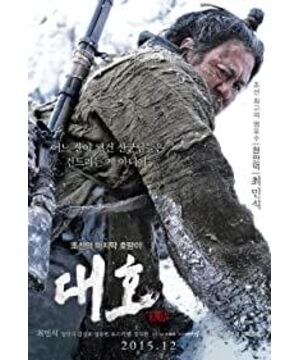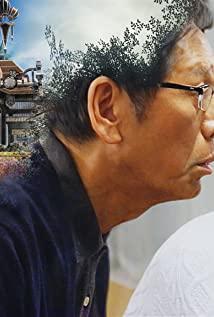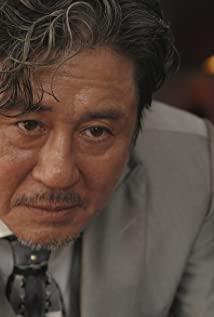Tangun, the ancestor of all the people in Korean mythology, is equivalent to the Yellow Emperor in China. Anyone with a little knowledge of Korean mythology knows that Tangun was born by his father and a bear girl. But there is one more detail to this myth that few people know about. That is, his father Hengxiong had a spare tire besides the bear at that time, which was a tiger. Legend has it that Hengxiong kept both bears and tigers in a cave, and could only eat garlic all day long for a living, and if he ate enough for 100 days, he could turn into a beauty and have sex with himself (the creator gods of the stick are so perverted: imprisonment, abuse, training , human and beast). In the end, the tiger couldn't take it anymore and chose the latter between becoming a beauty and not eating garlic. Although he was not blessed by the gods of the gods, he was still ranked in the immortal class and was revered as the god of the mountains and the spiritual totem of the Korean nation. The mascot of the 1988 Seoul Olympics was a tiger. The logo of the Korean football team is also a tiger, and their team is also known as the Tai Chi Tiger. It is only natural for Koreans to make a movie about tigers. Let's start talking about movies. Many people say that this film is the theme of the anti-Japanese theme, and I personally feel that the understanding is a bit one-sided. Let's imagine replacing the Japanese army character in the movie with an insatiable big businessman. This businessman hired a local tiger catching team to catch ""Shanjun". All other settings and plots remain unchanged. Think carefully about whether the overall effect of the movie can also come out? So this is definitely not an anti-Japanese theme. However, if there is no Japanese army setting, this movie will drop at least two stars. Then, what role does the Japanese army play in the movie, I think it should be analyzed from the following aspects: First: Tiger Mountain Jun is the protagonist in the movie alongside the old boy Uncle Cui. He has a lot of drama and there are many emotional scenes. As a fully CG-generated character, how can the image of the tiger be plumped up? First of all, the first major criterion for being a tiger is to be strong and powerful. How to be strong and powerful? Of course it's a clean kill. But as I said just now, Shan Jun has a lot of emotional scenes in this movie (about the love between Tiger and Uncle Cui who want to kill for the time being), and killing too much and too brutal may cause the audience's disgust. This is very unfavorable to the image of the tiger. How to resolve the contradiction between mighty and brutal? It's very simple, since you have to kill people, just kill the Japanese (there are also some Timberwolves lying with guns, poor). Second: If there is no setting of introducing aggressors (such as changing to profiteers), then tigers are simply tigers. After adding the Japanese element, in the hearts of Korean audiences, tigers are no longer just tigers, but have a strong national symbol. The image of Tiger Mountain Jun has been sublimated. Using the previously assumed profiteer setting, the era of the movie could be any era, even 2016. But join the Japanese army, and the film arrives at the darkest period of Japanese colonial rule on the Korean peninsula. Why do many movies like to choose the story in the background of historical turbulence, because the fate and feelings of the characters will be strengthened by the historical background. Make the audience more embarrassed (just imagine if "Saving Private Ryan" is not set in World War II but in Afghanistan or Vietnam). Third: Cater to the strong anti-Japanese sentiment in Korea. We often joke in the forum that "China-Korea friendship depends on Japan, and China-Japan friendship depends on South Korea". The hatred between South Korea and Japan is far greater than that between China and Japan. If both sides recognized the United States as their father after the war, the two countries would have been inseparable. Friends who follow Korean movies must have found it. In the early years of Korean films, most of the modern themes were based on the background of the civil war on the peninsula, such as "Common Security Zone", "Silmi Island", "Highland War", "Dongmo Village", etc. However, in recent years, the theme of North-South confrontation has gradually decreased, and the theme of anti-Japanese has gradually increased. In the past two years, such as "Assassination" and "Ming Liang Sea Battle" are all excellent works. It can be said that this subtle change is also a microcosm of the changes in domestic public opinion in South Korea after the US’s influence in East Asia has weakened and China’s influence has increased. Of course, there must be a place for the main theme of the movie. In addition to the tiger, which is a very symbolic element of the nation, there is another point that has been ignored by everyone. I will help you to point it out here: it is the place where the movie took place - Jirisan Mountain. Jirisan Mountain is one of the three sacred mountains in the peninsula, and its status is equivalent to that of Mount Tai in China. Among the three sacred mountains, China is more likely to be more familiar with Mount Kumgang in North Korea. The two Koreas have repeatedly asked about the opening of Mount Kumgang for tourism. I believe that friends who love news should know. Another is Hallasan Mountain in remote Jeju Island. Jirisan Mountain is the most majestic mountain range in Korea. There is a sea of clouds stretching for nearly a hundred miles under the main peak. This is also shown in many movies. Jirisan Mountain is already a sacred mountain, but this tiger can actually be called the mountain god in the sacred mountain. The Koreans in the movie have great respect for this Shanjun, and the people are very worried about hunting Shanjun. Even the Korean officer who helped the Japanese suppress the guerrillas was a little hesitant about the hunt. In the end, however, no one dared to resist the Japanese army. Because they were more afraid of the Japanese colonists riding on their heads than they were of the mountain gods. The Baidu Encyclopedia of this film actually says that "The film is based on the Japanese occupation period in Korea, and tells the story of a hunter master Cheon Mandok who fought the Japanese army desperately to protect the last tiger in Korea"? ? ? This is complete nonsense. Not to mention that Uncle Cui did not have any battles with the Japanese army at all. His only rivalry with the Japanese army was to start the Japanese army and let him be the guide. ? It is also inappropriate to say the word "protection" alone. It can be said that "Japanese Army Tiger Hunting" and "Uncle Cui and Tiger" are two different lines, which are related to each other and advance each other. The Japanese army hunted tigers, firstly, to satisfy the selfish desires of senior Japanese officials, and secondly, as the conquerors of the peninsula, the Japanese army wanted to conquer the gods (mountains and tigers) in the hearts of the local people. The leader of the tiger hunting team is out for revenge, while the other members are just eating. Qian Mande successively refused the invitation of the Japanese army and the tiger catching team. It would be superficial to only understand that he wants to protect tigers. The story of Qianmande and the tiger is divided into four stages: The first: In the winter of 1915, Qianmande's family was poor with only a few grains of rice and three potatoes, so he had to bite the bullet and go hunting in the mountains when the mountains were blocked by heavy snow. When he left, the embarrassment of the family saved him. The next little tiger made the foreshadowing. A sleeping child with a thin bedding, a haggard-faced wife, he felt that he was the only hope and only pillar of the family. If he did not stand up, the family would be doomed. So when he killed the big tiger and saw the little tiger, he thought of the tiger's home from his own home: the tiger's family is now without a pillar, and the fate of these two little tigers in this vast snow-white mountain is destined to be only death . If he had been killed by a tiger just now, his wife and children would have the same fate as this little tiger. So he moved with compassion and saved two little tigers and helped them through the most difficult winter. Second: In a roundup operation many years later, the tiger was driven to the direction of the village due to the mistake of the tiger driver (here the tiger is subjectively whitewashed). Causing Qianmande to kill his wife by mistake. But Shanjun let him go when Qianmande had fired a shot and had no power to fight back. Here, Qianmande and Tiger are evenly leveled - Qianmande caused Shanjun's mother (and possibly his father, the tiger's gender is unclear) to die, and Shanjun was spared; Shanjun caused Qianmande The death of his wife spared Qian Mande. Qianmande was hit hard, and he hung up his gun and made a living by picking herbs. Third: Ten years later, the Japanese army's tiger hunting operation began. Shan Jun's two brothers, children and spouses were successively killed, and Shan Jun's family was destroyed. And Qianmande's children took the initiative to participate in the hunt, and eventually died in the hands of the wolves (note that Shanjun let him go at the time, and he also helped Qianmande get back the body in the hands of the wolves). Qianmande's family was also completely destroyed. It can be said that the killing of Shanjun's family has nothing to do with Qianmande, and the killing of Qianmande's son is not a matter of Shanjun. Qianmande did not betray Shanjun's whereabouts, and Shanjun returned the child's body to Qianmande. Evened out again. Since then, the film has entered the first climax: this person and a tiger, one is the strongest hunter, the other is the strongest mountain god. They all failed and their worlds were destroyed. Late at night, they guarded the child's body by themselves. These two men who are as stalwart as the towering Jirisan have made their final decision. Fourth: The Japanese army transferred the regular army to participate in the hunting operation. Shan Jun killed all the Japanese troops with guns and live ammunition as if they were hanging up. However, the Japanese army did not give up, and the encirclement became smaller and smaller. Shanjun, who was seriously injured, felt that his life was not long, so he came to Qian Mande that night. (Uncle Cui can be described as an explosion of acting skills here, you must know that the tiger is full CG, he is playing against a green cloth) The bloody Shanjun, the old-fashioned Qianmande, and the cross-species confrontation, this is one life and another. An equal exchange between lives. "Yeah, and what's going on between us," Qian Mande murmured. The story reached its final climax. Qianmande took out the sealed shotgun, burned the remains of his family and his children, and climbed to the 1900-meter main peak of Jirisan Mountain alone to Tianwang Peak; Shanjun settled the remains of the little tiger. , walked out of the cave, the top of Jun's Landing overlooked the sea of clouds, and roared like a king. They all knew that today would usher in their final moment. The greatly humiliated Japanese army climbed towards the top of the mountain like maggots. The decisive battle between Qianmande and Shanjun began. Shanjun slowed down in the first round. He still did not want to kill Qianmande. At this time, the killing team and the Japanese army had already climbed up. Qianmande led Shanjun to the edge of the cliff. He did not want Shanjun to fall into the hands of the Japanese. Some people here ask, why did Shanjun and Qianmande have to fight in the end? According to the previous analysis, there is no hatred between them. Because although they have different paths, their life trajectories are intertwined with each other, and their fate is so similar: they are also the children of this forest, and they have also become the strongest existence in this forest. They have hurt each other's relatives They chose forgiveness and tolerance for each other, and the wheel of fate forced them to a desperate situation at the same time. "If you can talk, we will definitely be good brothers." "I have no reason to live anymore, and I believe you are too. Tonight is the last night. Lonely I can only think of you in the last moment, who is also lonely. Tonight, let's go together" At the end of the film, they embraced each other and died, their bodies were gradually covered by the white snow flying in the sky, and they merged into the embrace of the thousand-mile frozen Jirisan Mountain. The children of the two mountains became part of the mountain. . Why are they able to communicate? Because they have love in their hearts. Their love for their loved ones crossed the huge gap between species and passed on to each other. what! So we are so similar. Unconsciously, I wrote a lot, and finally I imagined that in fact, a movie with the same plot could be made in Northeast China, but if it was made in China, I guess the plot is: The King of Orion boldly rescued a little tiger from the hands of the landlord, After the tiger grew up, he killed the transport team of the devils on the mountain road all the year round. The devils recruited nearby hunters to hunt the tigers. The hunters could not bear to kill the tigers, so they turned their guns and started to beat the devils. The devil entered the village and was about to tarnish the innocence of Wang Da's childhood sweetheart Erni, when the tiger suddenly rushed out to repel the devil. Then Wang Dandan joined the nearby Anti-Union team, and together with the tiger, they formed the Legend of Tiger Heroes, one person and one tiger, killing the devils to the core. Haha, this plot is not bad! ! Written in Chengdu on August 21, 2016
View more about The Tiger reviews











